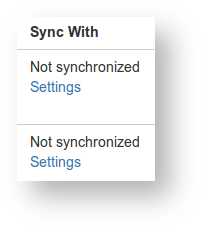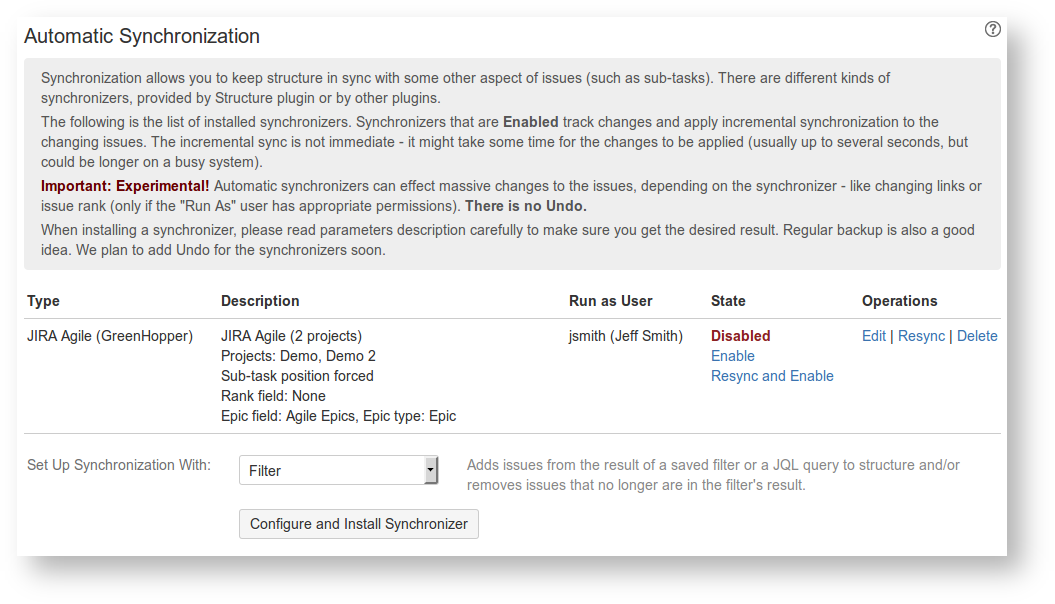TL;DR
If you ever have the misfortune of having to interrogate a Derby database, here are the takeaways:
- There's a primitive command-line utility called
ij. Its interactive use can be made tolerable by running it repeatedly from the shell via:ij -p <(echo "...connection properties...") <(echo "...sql commands...") - Once connected via
ij:SHOW TABLES;– shows tablesDESCRIBE <tablename>;– describes a particular table. If the tablename is uppercase, don't quote it here.- Quote uppercase table names in SQL queries. E.g.
SELECT "ID" from "SYNCS";
- If ij's output is too narrow (row values end with '&' indicating truncation), run the SQL:
maximumdisplaywidth 10000; - For BLOBs, this page of examples is your friend.
- The Derby docs are quite good, but use frames, so Google will take you to some random-looking page without any context. Start from here.
Introduction
The Structure plugin provides arbitrarily deep nesting of issues:
(nested issues are, incidentally, Atlassian's third-most popular feature request, JRA-4446. Go and vote!)
Twice now, after upgrading Structure, a client of mine found that the upgrade disables the auto-sync on Structures:
Nothing in the logs. While this gets worked out with ALMWorks support, I was asked to get things working again.
Command-line Derby spelunking
The Structure plugin's data is stored in its own embedded Derby database, in $JIRA_HOME/structure/db/. Derby is a fairly full-featured RDBMS written in Java.
First get the Derby distribution, which includes the ij command-line utility.
wget 'http://archive.apache.org/dist/db/derby/db-derby-10.9.1.0/db-derby-10.9.1.0-bin.tar.gz' tar zxvf db-derby-10.9.1.0-bin.tar.gz export PATH+=:$HOME/db-derby-10.9.1.0-bin/bin which ij # /home/redradish/db-derby-10.9.1.0-bin/bin/ij
There is rather minimal documentation about ij and Derby generally.
Create an offline database copy
The first thing to know is, you can't connect to a Derby database if another process is using it. So no connecting to the live Structure database:
ERROR XJ040: Failed to start database '/var/atlassian/application-data/jira/current/structure/db' with class loader sun.misc.Launcher$AppClassLoader@409a44d6, see the next exception for details. ERROR XSDB6: Another instance of Derby may have already booted the database /var/atlassian/application-data/jira/6.4.9/structure/db.
So first we must make an offline copy of the Structure database;
cp -ra /var/atlassian/application-data/jira/current/structure ~/structure_offline
Automate connecting to a database
ij is as primitive and ugly as you'd expect. There is exactly one way to invoke it: passing in a properties file for connection parameters, and a SQL file to run:
ij --help Usage: java org.apache.derby.tools.ij [-p propertyfile] [inputfile]
To auto-connect to a particular database, you need to create a properties file, and tell ij to use it. For instance I created a ~/structure_offline.props file to connect to the ~/structure_offline/db Derby database, copied above:
ij.database=jdbc:derby:/home/redradish/structure_offline/db
and finally we connect:
root@usw1-l-jira01:~# ij -p structure_offline.props ij version 10.9 CONNECTION0* - jdbc:derby:/home/redradish/structure_offline/db * = current connection ij>
Rather than create a pointless properties file on disk, the same thing can be achieved with a Bash process substitution:
root@usw1-l-jira01:~# ij -p <(echo "ij.database=jdbc:derby:$HOME/structure_offline/db") ij version 10.9 CONNECTION0* - jdbc:derby:/home/redradish/structure_offline/db * = current connection ij>
Derby command-line Crash course
To list all tables:
ij> SHOW TABLES; TABLE_SCHEM |TABLE_NAME |REMARKS ------------------------------------------------------------------------ SYS |SYSALIASES | SYS |SYSCHECKS | SYS |SYSCOLPERMS | SYS |SYSCOLUMNS | SYS |SYSCONGLOMERATES | SYS |SYSCONSTRAINTS | SYS |SYSDEPENDS | SYS |SYSFILES | SYS |SYSFOREIGNKEYS | SYS |SYSKEYS | SYS |SYSPERMS | SYS |SYSROLES | SYS |SYSROUTINEPERMS | SYS |SYSSCHEMAS | SYS |SYSSEQUENCES | SYS |SYSSTATEMENTS | SYS |SYSSTATISTICS | SYS |SYSTABLEPERMS | SYS |SYSTABLES | SYS |SYSTRIGGERS | SYS |SYSUSERS | SYS |SYSVIEWS | SYSIBM |SYSDUMMY1 | APP |FAVORITES | APP |HISTORY_V2 | APP |HISTORY_V2_ISSUES | APP |HISTORY_V2_PROJECTS | APP |LPROPS | APP |PERSPECTIVES | APP |PROPS | APP |STATISTICS | APP |STRUCTURES | APP |STRUCTUREVIEWS | APP |STRUCTUREVIEWS_V2 | APP |SYNCS | APP |VIEWS | 36 rows selected
Describe a particular table, in this case the SYNCS table:
ij> DESCRIBE SYNCS; COLUMN_NAME |TYPE_NAME|DEC&|NUM&|COLUM&|COLUMN_DEF|CHAR_OCTE&|IS_NULL& ------------------------------------------------------------------------------ ID |INTEGER |0 |10 |10 |NULL |NULL |NO STRUCTUREID |INTEGER |0 |10 |10 |NULL |NULL |NO MODULEKEY |VARCHAR |NULL|NULL|255 |NULL |510 |NO AUTOSYNCENABLED |INTEGER |0 |10 |10 |0 |NULL |NO USERNAME |VARCHAR |NULL|NULL|255 |NULL |510 |YES PARAMS |BLOB |NULL|NULL|21474&|NULL |NULL |YES 6 rows selected
Select a sample of values from a particular table. Note that the uppercase table names must be quoted, and there is no LIMIT clause unfortunately:
ij> select "ID", "STRUCTUREID", "AUTOSYNCENABLED" from "SYNCS"; ID |STRUCTUREID|AUTOSYNCEN& ----------------------------------- 100 |133 |0 101 |118 |0 102 |121 |0 .... 205 |282 |1 206 |221 |1 98 rows selected
To deserialize a BLOB, in this case the PARAMS column:
(thanks to this doc)
At this point I got tired of the lack of readline support in ij, and switched to passing in SQL commands from the bash prompt:
ij> root@usw1-l-jira01:~# ij -p <(echo "ij.database=jdbc:derby:$HOME/structure_offlin") <(echo "select * from SYNCS where STRUCTUREID=133") ij version 10.9 CONNECTION0* - jdbc:derby:/home/redradish/structure_offline/db * = current connection ij> select * from SYNCS where STRUCTUREID=133 ; ID |STRUCTUREID|MODULEKEY |AUTOSYNCEN&|USERNAME |PARAMS -------------------------------------------------------------------------------------------------------------------------------------------------------------------------------------------------------------------------------------------------------------------------------------------------------------------------------------------------------------------------------------------------------------------------------------- 100 |133 |com.almworks.jira.structure:sync-gh |0 |jsmith |3c3f786d6c2076657273696f6e3d22312e302220656e636f6de673d225554462d3822207374616e64616c6f6e653d22796573223f3e3c677265656e686f7& 1 row selected
Extracting BLOBs
In the result above, you can see the PARAMS BLOB is truncated (ending with '&' and isn't displaying anything human-readable. Some googling led me to these examples of the gloriously named SYSCS_UTIL.SYSCS_EXPORT_QUERY_LOBS_TO_EXTFILE function:
root@usw1-l-jira01:~# rm -f /tmp/results.txt /tmp/resultlobs.txt; ij -p <(echo "ij.database=jdbc:derby:$HOME/structure_offline/db") <(echo "maximumdisplaywidth 10000; CALL SYSCS_UTIL.SYSCS_EXPORT_QUERY_LOBS_TO_EXTFILE('SELECT * FROM SYNCS WHERE STRUCTUREID=133', '/tmp/results.txt', ' ', '\"', 'UTF8', '/tmp/resultlobs.txt') ")
ij version 10.9
CONNECTION0* - jdbc:derby:/home/redradish/structure_offline/db
* = current connection
ij> maximumdisplaywidth 10000;
ij> CALL SYSCS_UTIL.SYSCS_EXPORT_QUERY_LOBS_TO_EXTFILE('SELECT * FROM SYNCS WHERE STRUCTUREID=133', '/tmp/results.txt', ' ', '"', 'UTF8', '/tmp/resultlobs.txt')
;
0 rows inserted/updated/deleted
root@usw1-l-jira01:~# cat /tmp/results.txt 100 133 "com.almworks.jira.structure:sync-gh" 0 "jsmith" "/tmp/resultlobs.txt.0.291/"
root@usw1-l-jira01:~# cat /tmp/resultlobs.txt | xmllint -format -<?xml version="1.0" encoding="UTF-8" standalone="yes"?>
<greenhopper-synchronizer>
<projectId>0</projectId>
<projects>
<project>10044</project>
<project>10050</project>
</projects>
<epicType>6</epicType>
<forceSubtasks>true</forceSubtasks>
<useEpicLinks>true</useEpicLinks>
</greenhopper-synchronizer>
root@usw1-l-jira01:~#
The parameter XML corresponds with what one sees at the Structure page in JIRA, https://jira.company.com/secure/StructureSync.jspa?id=133
This is all nice and interesting, but..
back to the task at hand.
Identifying disabled synchronizers
This displays a list of URLs for disabled synchronizers:
root@usw1-l-jira01:~/structure# ij -p <(echo "ij.database=jdbc:derby:$HOME/structure_offline/db") <(echo 'select STRUCTUREID from SYNCS where AUTOSYNCENABLED=0 ') | grep '^[0-9]\+ *$' | while read id; do echo "https://jira.example.com/secure/StructureSync.jspa?id=${id}"; done
https://jira.example.com/secure/StructureSync.jspa?id=133
https://jira.example.com/secure/StructureSync.jspa?id=118
https://jira.example.com/secure/StructureSync.jspa?id=121
https://jira.example.com/secure/StructureSync.jspa?id=129
https://jira.example.com/secure/StructureSync.jspa?id=109
....
Assuming we have
- the last-known-good Structure backup in
~/last_correctly_syncing_structure/ - a recent copy of the actual Structure database in
/var/cache/rsnapshot/minutely.0/backup/var/atlassian/application-data/jira/current/structure
this hacked-together script reports URLs of Structures we need to fix:
#!/bin/bash -eu
ACTUAL_STRUCTURE_PATH=/var/cache/rsnapshot/minutely.0/backup/var/atlassian/application-data/jira/current/structure
CORRECT_STRUCTURE_PATH=~/last_correctly_syncing_structure
export URL='https://jira.example.com/secure/StructureSync.jspa?id=%d
'
ijdb()
{
ij -p <(echo "ij.database=jdbc:derby:db") $*
}
ij_allsync()
{
ijdb <(echo 'select "STRUCTUREID", "AUTOSYNCENABLED" from "SYNCS" order by 1;')
}
export HOME=/home/redradish
export PATH=~/db-derby-10.9.1.0-bin/bin/:$PATH
mkdir -p ~/structure
rm -f ~/structure/{actual,correct}
cd $ACTUAL_STRUCTURE_PATH
ij_allsync | grep "^[0-9]" | sed -e 's/ *|/\t/g' > ~/structure/actual
cd $CORRECT_STRUCTURE_PATH
ij_allsync | grep "^[0-9]" | grep -v "rows selected" | sed -e 's/ *|/\t/g' > ~/structure/correct
echo "The following Structures used to auto-sync, and now do not auto-sync:"
join -a1 -a2 ~/structure/{correct,actual} | awk '$2==1 && $3==0 { printf ENVIRON["URL"], $1}' | uniq
echo
echo "The following Structures auto-sync, and previously did not auto-sync:"
join -a1 -a2 ~/structure/{correct,actual} | awk '$2==0 && $3==1 { printf ENVIRON["URL"], $1}' | uniq
root@usw1-l-jira01:~/structure# ./structure_syncs.sh
The following Structures used to auto-sync, and now do not auto-sync:
https://jira.example.com/secure/StructureSync.jspa?id=130
https://jira.example.com/secure/StructureSync.jspa?id=146
https://jira.example.com/secure/StructureSync.jspa?id=170
https://jira.example.com/secure/StructureSync.jspa?id=184
....
https://jira.example.com/secure/StructureSync.jspa?id=277
The following Structures auto-sync, and previously did not auto-sync:
https://jira.example.com/secure/StructureSync.jspa?id=170
root@usw1-l-jira01:~/structure
The identified Structures can then be fixed by hand.



